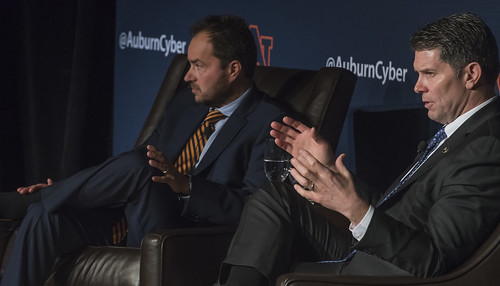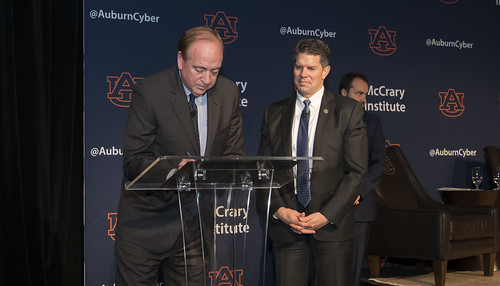FBI increasing partnerships with academia, presence in Alabama
Article body
FBI Deputy Director David L. Bowdich brought a message of strength through partnerships to Auburn University Friday, addressing his agency’s efforts since 9/11 and its expanding outreach mission with academia.
He called on students to serve their country—within the FBI or otherwise—and said there is increased opportunity to join the agency in Huntsville, Alabama, as the FBI is growing its operations there. The signing of a memorandum of understanding with Auburn during his campus visit will help address the demand for a larger future workforce trained in such disciplines as STEM and foreign language.
“This profession is rapidly changing,” Bowdich said. “We can’t recruit like we used to.”
He said that since 9/11 his agency has also worked hard to build the connections needed to best protect the nation.
“I’m not saying that it could not occur, it could, but we stay vigilant throughout the U.S. intel community to ensure that it never happens again—a 9/11 style attack—and I feel much more confident that that would be difficult to carry out because of all the logistics, the planning, the financial aspects to it, the communications that have to take place,” said Bowdich.
Bowdich said by working with academia, the FBI is only further strengthening its focus in defending against a new set of threats through technological and artificial intelligence advancements.
The agreement calls Auburn a partner with the FBI as it expands its workforce and operations at Redstone Arsenal in Huntsville. The university will educate and train bureau employees, and provide the next generation of specialists needed to take on critical roles across the agency. The FBI and Auburn will also share mutually beneficial information, research and technology that advances criminal justice and student and faculty opportunities.
The agency’s $1 billion investment to build a state-of-the-art campus in Huntsville will involve moving more than 1,000 FBI employees from Washington, D.C., and potentially adding thousands of additional jobs to Huntsville’s employment.
“The FBI making a significant presence in Huntsville enables Auburn to take on a leadership role to work jointly on threats targeting critical infrastructure sectors such as power and telecommunications,” said Rodney Robertson, executive director of the Auburn University Huntsville Research Center. “The impact this partnership will have will not only benefit the state of Alabama, but the nation as a whole as threat intelligence for analysis leads to a better understanding of new and emerging threats targeting our networks.”
Auburn’s Huntsville Research Center is a partner with many government agencies and industry including the U.S. Army and NASA.
Redstone Arsenal is a 38,000-acre federal research, development, test and engineering center that houses the U.S Army’s aviation and missile defense programs and NASA’s Marshall Space Flight Center. The FBI facility will be the agency’s second major outpost.
“Anytime two parties agree to work together, the most important ingredient is trust, and certainly on our behalf, we have great trust in you,” said Auburn’s Interim President Jay Gogue, in signing the memorandum of understanding.
“We feel the same way and we feel that this is a tremendous opportunity for both of your institutions to better serve this country,” responded Bowdich.
When it comes to research at Auburn, Bowdich said he’s very interested in the university’s work in the areas of artificial intelligence, 5G wireless technology and cybersecurity.
Frank Cilluffo, director of Auburn’s McCrary Institute for Cyber and Critical Infrastructure Security, asked questions of Bowdich in front of a capacity crowd at The Hotel at Auburn University and Dixon Conference Center. A well-known cyber expert himself, Cilluffo said the race to develop 5G is a competition the United States can’t lose.
Bowdich said he has had one briefing on 6G, or sixth generation wireless technology. Development of the technology, at home and abroad, is moving that quickly.
Bowdich did not hide his attempt to sway Auburn students in attendance to consider a career with the FBI. Since the agency is funded by taxpayer dollars, he said they can’t incentivize employment with high salaries available at private sector or other government agencies; what the FBI can provide is an opportunity.
“We have an opportunity to serve the public and to serve the country, and if the college students out there hear nothing else, I would say this: Serve your country in some form or fashion. It doesn’t have to be with us, but this is a great country we’re in,” Bowdich said. “Serve it, at least through part of your adult life, please, because it will provide you more gratification than that big check will, I promise you.
“It won’t relieve tension like that big check will, but I promise you at the end of the day you will go home feeling good about what you just did or about what you are doing, and that’s something that money cannot buy.”
Related Media
Media interested in this story can contact Communications Director Preston Sparks at (334) 844-9999 or preston.sparks@auburn.edu.
Auburn University is a nationally ranked land grant institution recognized for its commitment to world-class scholarship, interdisciplinary research with an elite, top-tier Carnegie R1 classification, life-changing outreach with Carnegie’s Community Engagement designation and an undergraduate education experience second to none. Auburn is home to more than 30,000 students, and its faculty and research partners collaborate to develop and deliver meaningful scholarship, science and technology-based advancements that meet pressing regional, national and global needs. Auburn’s commitment to active student engagement, professional success and public/private partnership drives a growing reputation for outreach and extension that delivers broad economic, health and societal impact.







